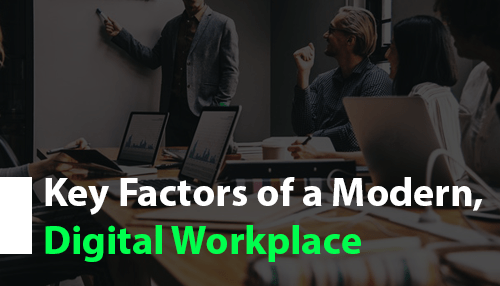We are past the time when the workplace was just a physical location occupied by employees during office hours. Nowadays, it is a connected environment giving instant access to anything an employee might need. The boundaries between the physical office and the place where the work actually occurs are becoming thinner, as is the separation between personal and professional life. In this post, we will discuss some of the key elements that make up a digital workplace in today’s business world.
Bring your own…
Bring Your Own Apps (BYOA), Bring Your Own Device (BYOD), and Bring Your Own Technology (BYOT) are three intertwined trends that are also bound to any modern digital workplace. The consummation and availability of IT technologies today make the present workforce more likely to bring their own smart devices into the office and use them for work-related tasks.
These trends continue to expand in organizations as more and more workers feel more empowered to use their own devices for business purposes.
Not bound to a single location
“Digital workplace” isn’t a precise definition. It isn’t actually a place at all in the physical sense. A true digital workplace enables work to take place regardless of the location or device in question. Even more, the work can happen in multiple physical locations at once, including traditional offices, homes, or co-working spaces.
Working from locations besides an office is not a new thing, and Australia is a prime example of this. Its business hubs are littered with such places, including high-tech spaces for coworking in Melbourne. Today’s always-connected, instant-access environment allows teams to share ideas virtually, as plans and work products take shape in the cloud.
Total transparency
Nowadays, in the digital age, privacy is eroding fast and sometimes isn’t present at all. Visionary enterprises can take advantage of this change to create more scalable businesses and maintain trustful, strong relationships with their employees, communities, and clients.
Entities that hide information are regarded with cynicism and doubt. Edelman’s yearly Trust Barometer which tracks the plummeting levels of trust globally in recent years shows that the rules have changed. Total transparency is proof of new ways of working with a proven track record of positive results.
Being this open, however, will be a challenge. Organizations should strive to build a culture of sharing that drives much better decision-making, quicker feedback loops, more employee engagement, and stronger relationships.
Gamification
Companies have incorporated gamification in engaging the staff through the usage of their enterprise social media networks. The main purpose of gamification in business is to improve worker engagement. Gamification is the application of game design methods and mechanics into a workplace.
Gamification, just like video games, taps into the basic instinct of search-hunt-reward which revolves around the terms of status and achievement. Since 2010, over 350 enterprises have launched major gamification projects, including consumer brands like Walgreens, NBC, Southwest, Panera, and more.
The digital workplace will grow in importance as it keeps lowering the dependence on a physical work location. This freedom from physical work and location will change not only how people work, but also how teams are formed and how peers can come together to solve any ad-hoc problems.
While concepts like transparency, gamification and bring your own will provide insights into new ways of working.



